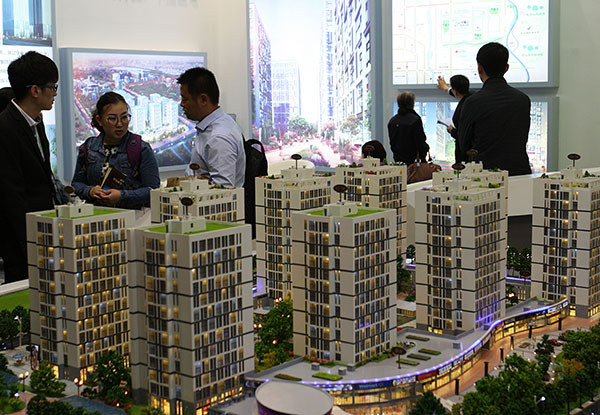Commercial-titled apartment sales hit
 |
|
Potential homebuyers at a property expo held in Beijing in April, 2015. [Photo by Wang Zhuangfei/China Daily] |
In Beijing's Chaoyang district, Yue Shulin, 31, a real estate agent, has been "taking a break" for more than two weeks, the longest time he has ever been off work since starting his career in the industry in 2009.
Yue focuses on deals for commercial-titled apartments-residential properties which were offices or shops once upon a time in commercial projects. But, since March 26, when Beijing authorities banned sales of these projects to individual buyers and suspended mortgage for such purchases, Yue has not closed a deal.
"It feels like the time when you are suspended at college and barred from pursuing your major. I had some 26 units on my list by mid-March. Now, broke. I've to find new resources, new clients and start from zero," he said.
In the past five years, commercial-titled apartments dominated the so-called quasi-residential market, and accounted for a significant part in Beijing's overall residential segment.
"Before the March 26 ban, commercial-titled apartments use to be an option for people who are not qualified to buy their first home or second home in Beijing. These projects were classified as commercial properties, so they were not subject to home purchase restrictions.
"That meant people with enough money could buy, and down payment requirement was about 50 percent, which is lower than 60 percent required for a second home.
"Commercial-titled apartments became a first choice for people without household registration (Hukou) and investors who wished to buy more than one home in the city, despite the fact that such properties were subject to higher utility bills. Demand for such properties was growing fast as supplies of conventional residential properties were limited," said Gao Liangyi, 43, who lives in a commercial-titled apartment in Beijing's Xicheng district.
Part of such high demand came from some startup business owners who used such apartments as both office and home. The average price of commercial-titled apartments was much more affordable than that of offices in commercial establishments or conventional apartments, said Gao.
According to a report by Beijing housing authorities, transactions for commercial-titled apartments surpassed that for conventional residential properties in March.
There were 7,312 new commercial-titled apartments in the market last month, up 530 percent year-on-year. And 4,675 of them were bought/sold by March 25, up 402 percent year-on-year.
The average price of such deals was 26,979 yuan ($3,967) per square meter, up 24 percent year-on-year. Overall, 7.77 billion yuan ($1.1 billion) was invested by homebuyers in such properties during the March 1 to 25 period, up 508 percent year-on-year.
Zhang Dawei, chief analyst with Centaline Property, said, "The ban on sales of such properties to individual buyers shows authorities' determination to curb speculation in every aspect of the real estate market".
"For investors who have already bought such properties, their value wouldn't appreciate as expected. Such properties may have to be used by themselves. For developers of such properties, they need to find a way out of these projects to realize their commercial value."
Other cities will likely introduce similar measures against speculation in the quasi-residential market. "They, too, may ban sales of commercial-titled apartments to individuals," said Zhang.








